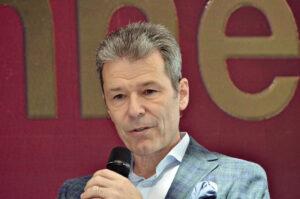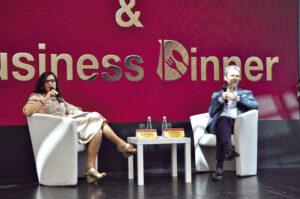Slowly we can make plans again
In May Trade magazin organised its BusinessMeetup&Dinner, where Szilvia Krizsó interviewed Péter Noszek, the CEO of Nestlé Hungária. Péter Noszek has worked at Nestlé for 33 years. He has been in his current position for 6 years, which is a record, but earlier he represented the company in various capacities on three continents in six countries.
This article is available for reading in Trade magazin 2024/8-9
Cocoa and coffee prices have skyrocketed
It was in 1978 that the per tonne price of cocoa peaked, when it climbed as high as USD 5,000 in New York. During Peter Noszek’s career the price has been moving between USD 2,500 and 3,800, but a few weeks ago it surged to USD 12,000 per tonne, which is a staggering figure. As for coffee, the robusta variety’s price was the first to soar, with prices doubling, but now arabica’s price is also going up – albeit to a lesser extent. “Last year’s record inflation of more than 30% is unusual, the last time we had it was when I started working in the 1990s. This is when the whole system is upset and one needs smart financial manoeuvres to keep the balance sheet healthy”, told Péter Noszek.

“In spring, we had two good months in a row for the first time. When you have three or four months like that, you can talk about a positive trend. It is certain that if consumers feel that they have more money in their pockets as a result of official communication and the effective increase in real wages, this will be reflected in the retail sector, which will also have a positive impact on us, suppliers” – Péter Noszek, Managing Director of Nestlé
Inflation eases, we can finally make plans
It is needless to say there are good signs too: we are still a long way away from pre-Covid prices, but inflation is getting lower in many categories. As a supplier, Nestlé is a month ahead of the retail sector, which sells products to consumers. This spring – for the first time this year – they had two good months in a row. According to the CEO, we have reached a point where prices won’t become lower for a long time. But the worst thing isn’t this but the uncertainty: this is what is burdening both investors and consumers.
Emerging private labels and a drop in volume sales
In difficult situations a large proportion of consumers are turning to private labels. Péter Noszek acknowledged that this has led to a dramatic decline in the branded products market for many companies. Nestlé spends CHF 1.7bn a year on research and development before launching a new product. Private labels then copy the results, with smaller added value. “What is more, they don’t have to spend on marketing at all. Pet food is a volume business, accounting for two-thirds of the company’s EUR 283bn sales, and it has seen the biggest decline in volume sales”, revealed Péter Noszek.
Investment is good if it returns
An important issue for the food industry at the moment is the HUF 1,500bn grant programme, from which the government is now spending HUF 750bn on developing the sector. According to Péter Noszek, this positive initiative will only make sense if this sum doesn’t become “charity money” and companies are able to move towards efficiency improvements, the introduction of new technologies, and realising sustainability developments. Nestlé Hungária’s factories in Szerencs, Diósgyőr and Bük are competitive and utilise modern technology.

„The worst thing is uncertainty, which is a heavy burden on investors and consumers” – Szilvia Krizsó was talking with Péter Noszek on the stage of Business Meetup&Dinner
Vocational training is a sectoral responsibility
“We have just built a warehouse that is 42 metres high and there isn’t a single person in it. There isn’t even any lighting, as robots work in the dark and a man outside watches on a tablet what is happening in four shifts”, explained the CEO. Nestlé is working on realising dual vocational training in Bük and Szerencs. They are cooperating with local educational institutions to give students marketable practical training. Péter Noszek believes that Hungarian companies have a great responsibility in this, especially if they have a Western European background. //
Related news
Experience instead of routine
🎧 Hallgasd a cikket: Lejátszás Szünet Folytatás Leállítás Nyelv: Auto…
Read more >Related news
II. Green Gastronomy – Marketing Communication Workshop organized by the MMSZ HoReCa and Green Section
🎧 Hallgasd a cikket: Lejátszás Szünet Folytatás Leállítás Nyelv: Auto…
Read more >Nearly 140 domestic suppliers, 60% growth – SPAR Regions Treasures program accelerates with AI solutions
🎧 Hallgasd a cikket: Lejátszás Szünet Folytatás Leállítás Nyelv: Auto…
Read more >








